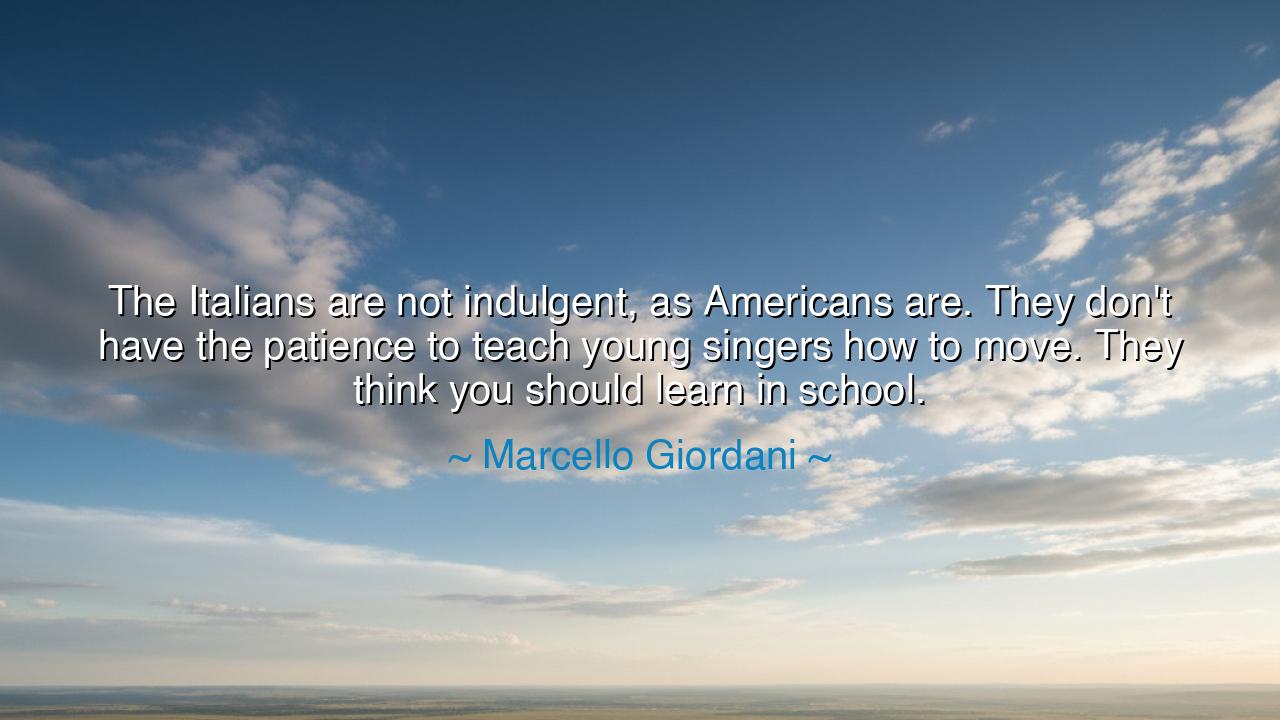
The Italians are not indulgent, as Americans are. They don't
The Italians are not indulgent, as Americans are. They don't have the patience to teach young singers how to move. They think you should learn in school.






Marcello Giordani, the great Italian tenor whose voice carried across the grand stages of the world, once proclaimed: “The Italians are not indulgent, as Americans are. They don’t have the patience to teach young singers how to move. They think you should learn in school.” These words, though spoken of music and opera, unveil a deeper truth about culture, discipline, and the differing expectations placed upon those who would rise to mastery. For in them we hear not only the contrast of two nations but the eternal question of how much the teacher must give, and how much the student must bring already prepared.
The Italians, as Giordani describes, expect readiness. Opera is their birthright, woven into the fabric of their culture. To them, the stage is sacred ground, and only those already trained, shaped by rigorous schooling, and disciplined in movement and presence may step upon it. They demand of the singer not indulgence but excellence, not apprenticeship upon the stage but mastery before it. For in their eyes, art is not the place to stumble and learn, but the place to arrive refined, with skill already honed.
By contrast, Giordani notes that Americans are more indulgent, more patient with the inexperience of youth. In their theaters and schools, there is greater tolerance for mistakes, a willingness to teach as one goes. Theirs is a culture of experimentation, of allowing the raw and the unpolished to grow in the public eye. While this can lead to innovation and freshness, it can also produce unevenness and delay in the attainment of true mastery. Thus, the singer in America may find a gentler hand, while in Italy he encounters only the stern demand: “Be ready.”
This difference is not confined to opera. History tells us that nations and cultures have always approached training differently. In Sparta, the young were taken from their families and trained relentlessly until they were warriors; no indulgence was given, no patience for weakness shown. In Athens, by contrast, education was broader, allowing room for philosophy, art, and gradual growth. Both produced greatness, though in different forms. So too, in Giordani’s words, do Italy and America reveal two paths toward the summit of art: one through strict discipline before the stage, the other through gentler correction upon it.
Giordani’s observation arises from his own journey, for he himself trained in Italy, immersed in the old expectations of rigor and preparation. He knew that before stepping into the great houses of opera—La Scala, the Met, Vienna—he would be expected to carry himself not as a student but as a master. He did not despise this; he recognized it as part of the tradition that had preserved opera’s dignity for centuries. His words are less complaint than insight, teaching young singers that if they would succeed in the old world, they must arrive prepared, for indulgence will not be offered.
The lesson for us, O seekers, is that every stage of life requires preparation. Do not assume that the world will patiently train you when you arrive; often, it will demand that you already know. This is why school, whether literal or metaphorical, is sacred: the place of practice, of error, of learning. The stage—be it in art, in work, or in leadership—is no place for apprenticeship. There, the world expects performance. If you are wise, you will stumble and learn in the quiet, so that when the lights are upon you, you may stand firm and shine.
Therefore, remember Giordani’s words. Embrace discipline in your training. Do not scorn the long hours of practice, the steady accumulation of skill, the sometimes harsh correction of teachers. For though patience may be granted in some places, in others you will find only the expectation of readiness. If you prepare with diligence, then whether you stand in America, in Italy, or in the arena of life itself, you will not falter when called to perform. And in that moment, your song will rise not as the cry of a student, but as the voice of a master.






AAdministratorAdministrator
Welcome, honored guests. Please leave a comment, we will respond soon